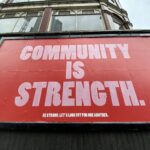Early July 2nd, a neighborhood block party became a mass shooting site in South Baltimore. At last count, three people were killed and 28 were injured. I will spare you the details of what kind of guns were used. You have read and seen enough of these stories to know it was a horrible act of violence with guns that don’t belong in this world. Mass killings are not a 2nd amendment right and no one in a free nation ought to live in daily fear of where the next attack will occur.
Nine people were also injured in a mass shooting on a recent Sunday morning in Cleveland. The Fourth of July weekend has become a time to dread unexpected shootings and deaths. Thanks to out-of-control gun violence, our annual celebration is a day to wonder where will the next attack occur. It has morphed into Fear Day. Sadly, and unbelievably, it is like every other day now in the “land of the free”.
Isn’t it time to demand an end to our national impotence? Do we really believe there is no way out? That we are doomed to watch reports of daily mass shootings and wonder if we are safe at the community pool? Our grandchildren or children are at risk going to school? Our teenager might be killed knocking on a door or walking down the street?
The Washington Post lead story under the heading of Local Crime & Public Safety on July 6 reported: 10 killings in 5 days in D.C. leave an international trail of grief. Not all these shootings were classified as mass shootings, involving injury or death to four or more people as defined by the National Gun Archive. The newspaper story details the personal loss to the families and communities from the murders of these ten people. It attempts to move us past our collective numbness to realize every death is somebody’s son, daughter, brother, sister, and friend.
When one person dies unexpectedly in a hospital, the staff of the hospital is required to investigate the death. They call this process “root cause analysis”. Their goal is not to make a superficial judgment about why someone died unnecessarily. As complex as the circumstances might be, there is a review to get as clear as possible about the causes. The goal obviously is to prevent any unnecessary deaths from occurring again.
This is an imperfect system. And it perhaps sheds light on a path out of our collective numbness and inability to act in the face of so many unnecessary and traumatic deaths.
As a nation, historically, when we set a goal, we commit resources and organize to do whatever it takes to achieve the goal. We had what seemed an ambitious goal to land a human on the moon. We are at work to end some of our most deadly diseases. We didn’t know what Covid was and organized to find treatments. Many of us were appalled by the January 6 attack on democracy. We organized to get to the root causes to protect democracy.
We have a national election a year from November. Why is it not possible for our government and our leading institutions to commit now to doing a collaborative, data-driven review of the root causes of our out-of-control mass shootings and gun violence? What if every citizen concerned about these deaths wrote to President Biden, all their elected representatives, their school and faith community leaders and used social media to call for a radical investment in understanding the complex causes – gun availability, mental health, poverty, suicidal hopelessness, and causes we may not know. And in a reasonable time, begin to make policy changes and invest in the solutions to end this national travesty.
Each of us can be the heroes fighting to end mass shootings and gun violence. I am sending this post and a note calling for action to all the elected people who represent me and others in positions of power in my community. Might you consider doing the same and suggesting this action to others? As Marvin Gaye sang so painfully: “What’s going on? Too many people are dying.”




0 Comments